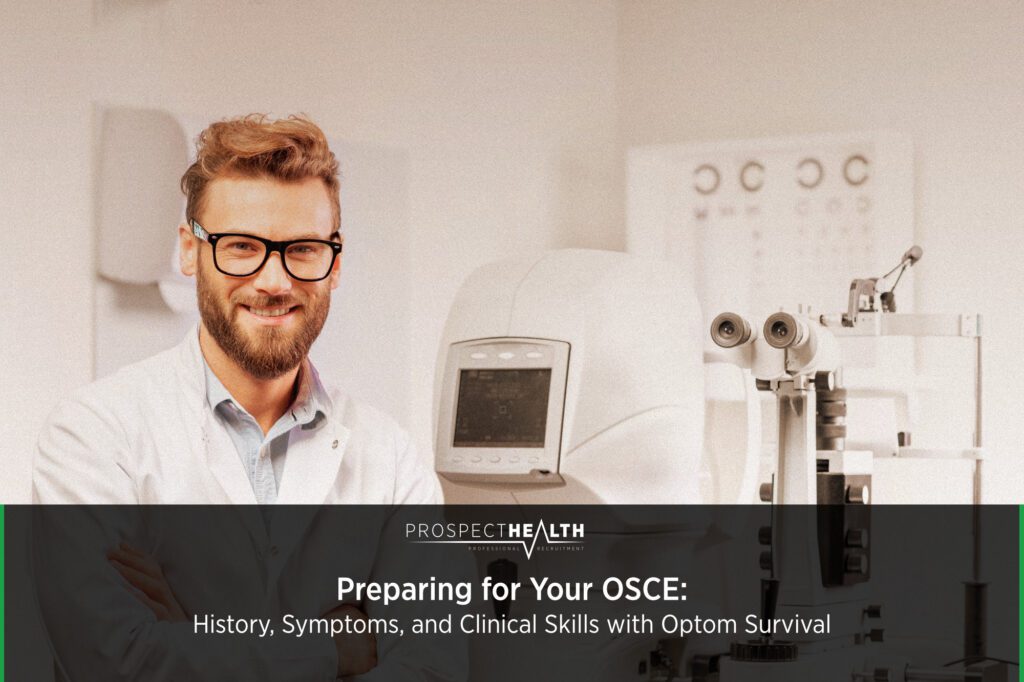
Preparing for Your OSCE:
History, Symptoms, and Clinical Skills with Optom Survival
If you’re a pre-reg optometrist preparing for your OSCE, understanding how to approach history-taking, symptom assessment, and clinical stations is essential.
Optom Survival recorded a webinar for pre-reg students with the key strategies to help you succeed in the OSCE. And we have created the blog below from the webinar to give you handy access to the content.
To access all our pre-recorded webinars via our online learning management system, please complete the form below:

Access our pre-recorded Optometry Webinars
With 17 stations in total (including two rest stations and one pilot), you’ll be assessed on 14 core stations, and the pass mark is typically 10 out of these 14. Here’s an overview of key strategies to help you succeed.
Understanding History and Symptoms Stations in the OSCE exam
History and symptoms stations assess your ability to gather information and form a diagnosis based on the patient’s reported symptoms. Common scenarios include:
- Sudden or gradual visual loss
- Diplopia (double vision)
- Headaches or other ocular symptoms
When approaching these stations:
- Consider all potential causes – For example, sudden visual loss could indicate anterior uveitis, acute angle-closure glaucoma, central retinal artery or vein occlusion, macular degeneration, diabetic maculopathy, or central serous retinopathy. Gradual visual loss might suggest refractive error, retinal detachment, or glaucoma.
- Ask the right questions – Clarify whether vision loss is near or distance, constant or intermittent, and whether the patient has relevant medical conditions such as diabetes. Ask about associated symptoms like pain, nausea, or headache.
- Identify red flags – Be able to recognise urgent conditions that require hospital referral, such as retinal detachment or acute glaucoma.
Approaching Clinical and Practical Stations
In addition to history-taking, the OSCE will test your clinical and practical skills:
- Differential prism – Know how to apply Prentice’s Rule (P = C × F) for prismatic calculations.
- Visual acuity conversions – Be comfortable converting LogMAR to Snellen without a calculator.
- Exam findings explanation – Communicate your observations clearly to patients, e.g., describing macular changes in wet AMD while considering risk factors like family history or smoking.
Communication and Patient Interaction
Effective communication is crucial. During stations:
- Explain your findings in a clear, empathetic manner.
- Demonstrate awareness of the patient’s emotional response and provide reassurance.
- Be concise but thorough, ensuring patients understand the implications of your examination and any next steps.
Preparing Effectively
- Review common ocular conditions and their typical presentation.
- Practice forming clear differential diagnoses based on symptom patterns.
- Familiarise yourself with the OSCE layout, diagrams, and documentation requirements.
- Understand relevant regulations, such as driving standards and visual requirements.
Final Thoughts
OSCE preparation is about combining knowledge, clinical reasoning, and communication skills. By practising history-taking, understanding symptom patterns, and refining your practical techniques, you’ll approach each station with confidence.
Remember: focus on the essentials, ask the right questions, and communicate clearly — these are the skills that will help you succeed.
Are you preparing for your OSCEs and looking for career guidance too?
Prospect Health works with over 100 employers eager to hire newly qualified optometrists.
Alongside revision support, we can help you secure the right role for you when you qualify.
You can call us at 01423 813 452 or email us at [email protected]
Or view the rest of our Optometry jobs here!

Next Up: Mastering Dispensing Competencies: A Guide for Pre-Reg Optometrists
Dispensing can feel overwhelming during your pre-reg journey, especially when examiners start asking about calculations, frame choices and lens designs.
But the good news is, you don’t need to know everything in depth — just a strong grasp of the fundamentals.

Talk to a specialist:
VICTORIA ASHTON
Specialist Recruitment Consultant
I am an experienced recruitment professional with a diverse background spanning GP recruitment, the Commercial sector, Practice Management, and most recently, Optometry.
After completing my degree as a mature student, I embarked on my recruitment career and have since found the industry both challenging and rewarding…


